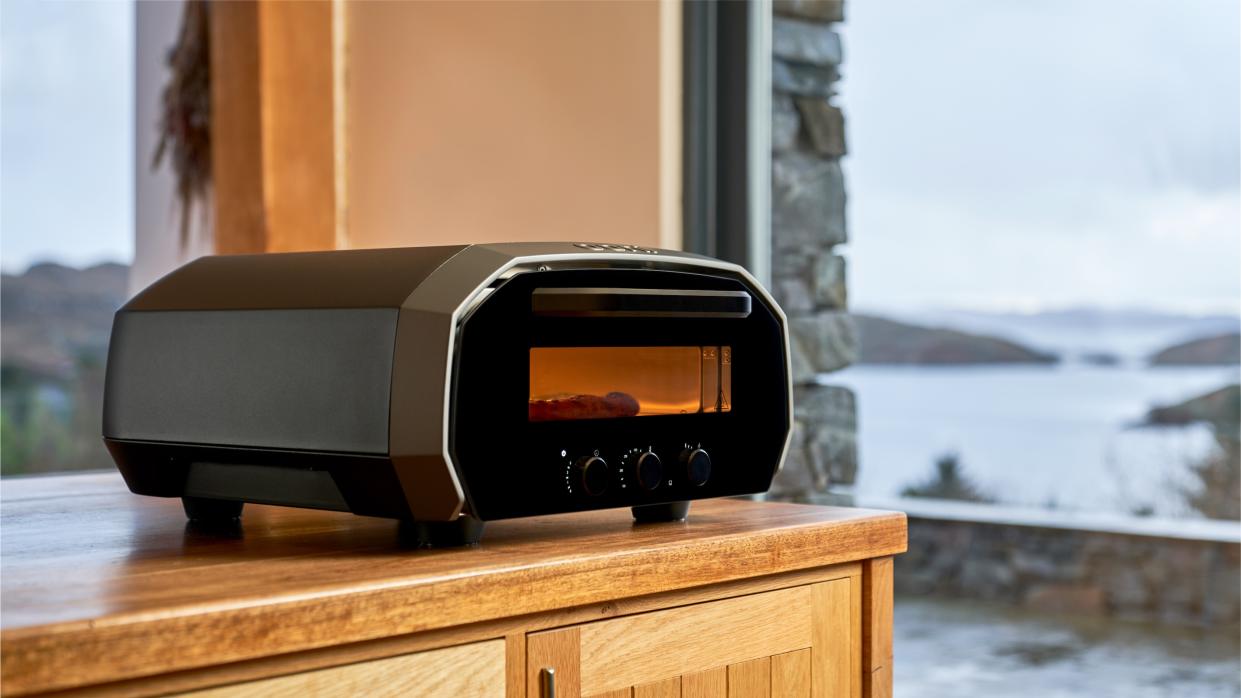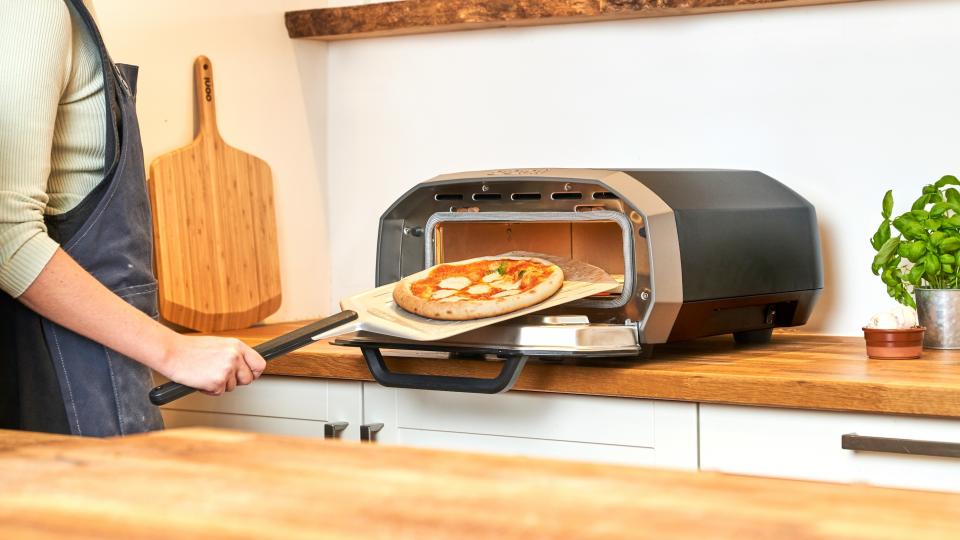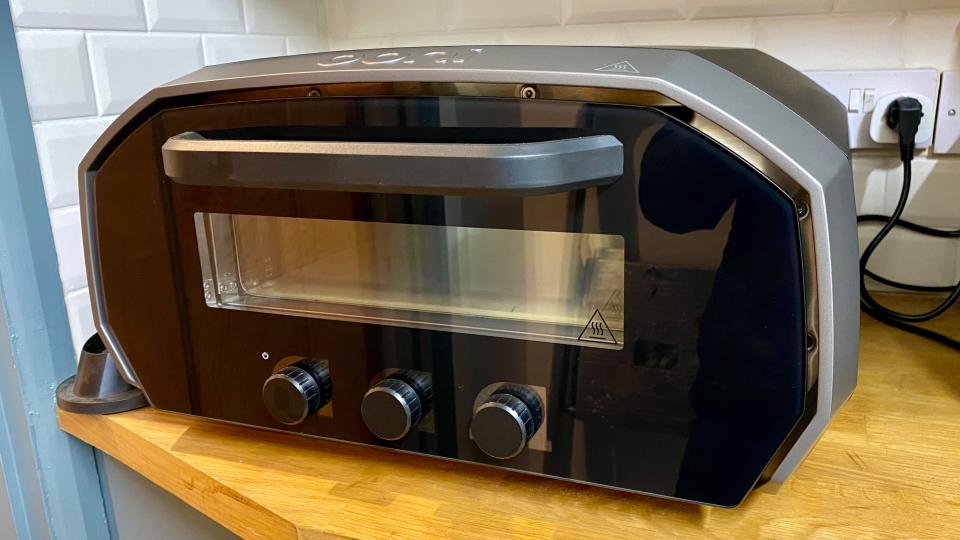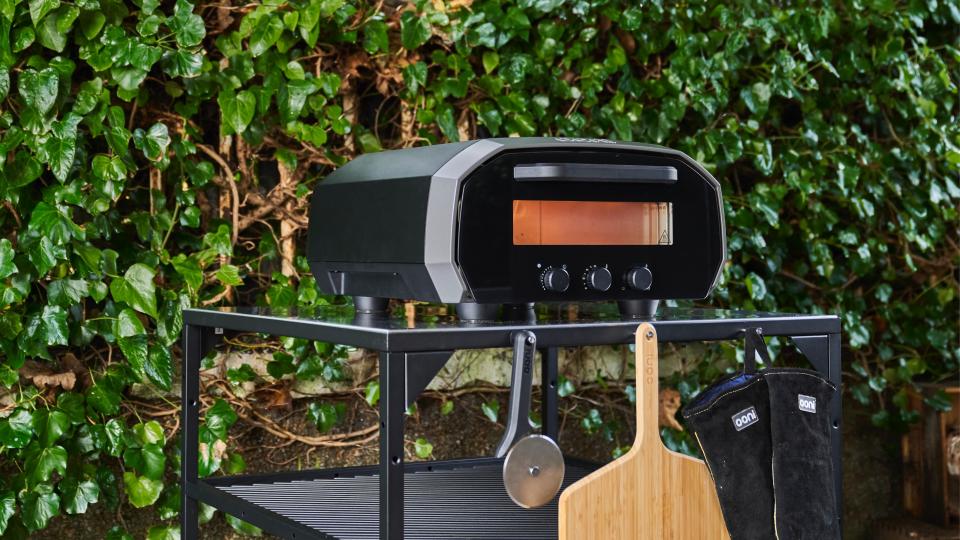Ooni Volt 12 pizza oven review: sensational electric pizza oven for indoor and outdoor use

Welcome to T3's review of the excellent Ooni Volt 12, a new style of electric pizza oven for discerning pizzaiolis – and a worthy contender for a high ranking in our guide to the best pizza ovens.
Not many people will argue against Ooni being credited as the first company to bring pizza ovens to the masses. It all kicked off in 2012 when UK-based Finn Kristian Tapaninaho introduced the original Ooni, an affordable stainless steel-lined, wood-fired outdoor pizza oven with a 12-inch cordierite stone. You have to remember that before the first Ooni oven came out, the only option was a self-built igloo-style brick oven.
While a standard oven is just about okay for making an off-the-shelf pre-made pizza, it is absolutely useless at making an authentic pizza from scratch because the level of heat it produces is simply not hot enough. To make a properly edible pizza with dark base, crispy crust and well-cooked toppings you need at least 400?C of scorching heat. And that's where the original Ooni came to the rescue. For the first time, anyone could have a go at making and baking their own fresh pizzas from scratch and with very little experience. Actually, I will rephrase that – baking pizzas does involve quite a steep learning curve which, rather handily, I have written all about in my guide to how to make pizza at home.
Anyway, fast forward a decade and Ooni’s portfolio has expanded to include a range of both wood-fired and gas-powered ovens along with the Volt 12 beast I’m reviewing today - Ooni’s first electrically-powered indoor and outdoor table-top pizza oven.
How did the Volt 12 get on in my multiple tests? Let’s find out.
Ooni Volt 12 pizza oven review: price and availability
The new Ooni Volt 12 has just dropped in price from £799 to around £640. You can buy it in the UK direct from Ooni, Lakeland and John Lewis & Partners, priced at £639.20.
Ooni Volt 12 pizza oven review: why I prefer an electric pizza oven

I’ve reviewed numerous domestic pizza ovens over the years and I’ve come to the conclusion that I prefer the electric method. Why? Well, take the conventional wood-fired option for instance. This involves preheating the oven for up to three hours before baking time. It also involves brushing the wood cinders to one side while scorching your hand in the process. You’ve then got to keep feeding the fire or the base of the oven will lose temperature and the base will be soggy. Lot’s of hassle, in other words.
Gas is a much easier option in my opinion but unless the pizza oven has a door on it, you can be sure it will use tons of gas before you’ve even started baking, especially in cold weather when the oven is fighting against low ambient temperatures. However, the worst thing about both wood and gas pizza ovens is that you can’t use them indoors, which means the only time you can make your own pizzas is when it isn’t raining or too cold for the oven to run at optimum temperatures. And that, in the real world, means the oven will hardly ever be used.
This kind of malarky simply doesn’t occur with an electric oven and I discovered that instantaneously on reviewing the blooming marvellous Sage Smart Oven Pizzaiolo. This electric pizza oven was a revelation to me when I saw and tasted the results of its first bake. The pizzas quite literally ticked every box – mountainous crusts, dark crispy bases and perfectly cooked toppings. Moreover, the Sage is mind-blowingly easy to use, efficient and reassuringly predictable. And, best of all, it doesn’t create any smoke unless you’ve put too much flour on the peel.
I know what some of you are thinking – you can’t compare the results of an electrically-baked pizza to an authentic wood-fired pizza. Well I can because I’ve eaten both styles and at no time have I ever said to myself ‘wow, the flavour of that wood smoke is intensely satisfying’. What I can detect, though, is a good pizza base from a bad one. And that’s all down to the quality of the dough, its lightness, saltiness and deep airy crunch.
So, while I will still continue to use my excellent Witt Etna Rotante gas-fired outdoor oven during the summer months, I will continue to stick to an electric model the vast majority of the time.
Ooni Volt 12 pizza oven review: design

The new Volt 12 is unmistakably Ooni through and through. In fact it looks like a taller and slightly slimmer version of the company’s cracking Ooni Koda. However, that means it is big with a capital B. At 57cm in depth without the front door handle, 51cm in width and 27cm in height, it may well be too big for the average UK kitchen worktop unless the unit is pulled forward away from the wall when in use so its front feet are just near the edge of the worktop surface. I hasten to add that my worktop is 61cm in depth and it worked just fine, with enough space around the oven for ventilation. That being said, this oven is also designed for outdoor use – as long as it isn’t raining.
For me, one of the major bonuses with the Volt 12 is that its square 13-inch cordierite stone fits flush across the entire base of the interior and that means it will easily accommodate pizza bases that are slightly wider than the 12-inch norm. The Sage, by comparison, has a circular 12-inch stone and sometimes I’ve had pizzas that have overlapped onto the non-heated metal sides.
And speaking of heating… Like the Sage, the Volt 12 uses two old-fashioned circular heating elements, one above the stone and the other below. It’s an ingeniously simply design that works miracles at keeping both internal and stone temperatures consistent – and blazingly hot to boot.
According to Ooni, the Volt 12’s springy door is triple-paned in borosilicate glass for maximum insulation. How clean the glass remains after multiple bakes is open to debate because my Sage’s glass is almost black. I would definitely recommend a good wipe down after every bake.
With the Sage oven I always need to use a torch to peek inside but the Volt 12 has a bright interior LED light and this makes a massive difference because everything happens so quickly in the world of pizza baking – one second it’s all looking dandy, three seconds later you’ve got a burnt crust.
Ooni Volt 12 pizza oven review: features

The Ooni Volt 12 adopts a different type of interface to the Sage Pizzaiolo. Where the Sage’s controls are labelled with a variety of icons depicting different pizza types (deep pan, medium crust, thin crust and wood fired), the Volt 12 at first seems a little more confusing. It isn’t really because there are just three knobs – timer, temperature and a third knob that adjusts the temperatures between the top and bottom heating elements.
Unlike the Sage’s more simplified icons, the Volt 12’s illuminated temperature display goes up in increments from 200?C to 450?C. Yes, many professional ovens go to 500?C but, believe me, 450?C is plenty enough for a top-flight crispy pizza.
To make temperature selection and heat ratio easier for users, Ooni provides a manual and it’s worth checking it out even though the terminology for the different types of pizzas is a bit odd. For instance, I’ve never heard a deep-pan pizza called a Grandma. Nor have I heard of a Detroit, Bar, New Haven or Tavern Style pizza. But I do know about New York and Neapolitan pizzas which are listed at the end. Anyway, the gist of the explanations is to help the user determine the best temperature for the style of pizza and, more importantly, the best balance of temperature between the bottom heating element and the top. Once you get the hang of it, it’s pretty simple, it must be said.
The final knob to the left is the timer and, like the others, you simply turn it to the manual’s suggested time scale. I personally just used the timer as a reminder so I kept setting it to around a minute in case my mind wondered off. Baking pizzas is extremely hands on and if you take your eye off the ball for just a few seconds, things can quickly turn very bad and before you know it you’ve got a carbonised drain cover.
Ooni Volt 12 pizza oven review: performance

The first thing I did after getting the Volt 12 out of its huge box was run a seasoning sequence to burn off any manufacturing impurities. Astonishingly, the oven hit the requisite 450?C in about 20 minutes, and that’s a lot faster than any gas-powered pizza oven I’ve ever used. I then let it cool down before heading into my first test.
Since I always make Neapolitan pizzas, I followed Ooni’s instructions and dialled in 450?C. I didn’t even touch the heat balance knob and the very first pizza was a howling success. Some might say my second attempt using pepperoni and anchovies (a sort of surf ’n’ turf) came out too burnt but I like it that way. Granted, I did have to turn the pizza half way through using Ooni’s excellent turning peel but then I’ve had to do that with every pizza oven, including the Sage. Crucially, the heat in the upper chamber of the Volt 12 is much more uniform than any wood- or gas-fired pizza oven I’ve ever used, but it’s also still a few degrees hotter at the back than it is at the front.
I admit to having not tried the majority of other heat settings though I did follow up a few days later with an off-the-shelf Pizza Express pizza using the 225?C setting and it was a lot better than my standard oven has ever produced.
I should add at this juncture that dough ball quality is a key element when it comes to making exquisite homemade pizza. Since I am both lazy and not particularly good at making fresh pizza dough, I use Peddling Pizza’s fresh dough balls (£25.95 for a dozen) that arrive semi-frozen. They are off-the-scale exceptional and always produce pizza with towering edges that are almost ciabatta like in internal structure. They are also deliciously salty. I can’t recommend these dough balls enough so head over to the Gozney website if you’re interested. Alternatively, try Ooni’s own Classic Dough Balls which are also exceedingly tasty.
Ooni Volt 12 pizza oven review: verdict

The best thing about an electric pizza oven like this is that it can be used all year round. It’s also cheaper to run than a gas alternative (about 5p per pizza) and it’s a lot easier to use than any wood-fired oven. Granted, at around £640 the Ooni Volt 12 isn’t cheap and it may even be too large for a small kitchen, but I’ve been hugely impressed by its performance which is up there with the Sage Pizzaiolo for baking consistency and ease of use. Highly recommended.
